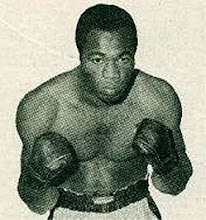Mauro Mina, "The Chincha Express"
Late in the afternoon of November 18th, 1950 Lima Peru’s daily “La Crónica” informed its readers that a legion of young amateur fighters from the small southern town of Chincha had arrived in the capital city. They were scheduled to be part of an all-amateur card, which was to take place that night at the boxing ring located in the grounds of the old National Stadium. The news also mentioned that among them was a sensational 17-year-old middleweight who had reportedly been victorious and undefeated in “some thirty amateur fights”. The grandchild of Afro-Peruvian slaves, a decade later he would be ranked by Ring Magazine as the #1 contender for the light heavyweight title then held by Harold Johnson and hailed as the best Peruvian boxer of all time. His full name: Mauro Mina Baylon.
However, casual readers of “La Crónica” had no reason to be particularly interested. New talent was hardly any news in the Peruvian boxing scene of the 1940s and 1950s. At the time of Mina’s arrival, Lima still had plenty of boxing activity. Not only was Lima host to the best South American boxing had to offer, but a few years before some notable American fighters had been brought to Peru. Tommy Loughran stopped the Argentinean Vincent Parrile fresh off his loss to Primo Carnera in 1935. Joe Louis had stopped by in February of 1947 for an exhibition during his Latin American tour. In 1950 Lima’s Acho Arena had the privilege of staging Charley Burley’s farewell fight against Uruguayan Pilar Bastidas. Finally, while Mina was coming to Lima as a virtually unknown amateur, the capital city was host to Artie Towne, the great middleweight from New York (at a time when he was ranked among the best ten in the world in the 160 pounds) who was in town for his fights against local idol Antonio Frontado and Dominican journeyman Carlos (Charlie) Perez.
Competitive professional boxing in the capital city boosted local talent. Promoters, most importantly former fighter Max Aguirre, put on as many as forty shows during the so called boxing season each year and many faithful followers showed regularly every weekend to cheer on their favorite local pugilistas. The above-mentioned Antonio “Antuco” Frontado, a smooth middleweight who was famous for presenting his foreign rivals with thorough boxing lessons on his way to easy decision wins, was probably the most notable of these. Other names such as welterweight Jose “Bom Bom” Coronado, born in Chincha like Mina and tragically dead from cirrhosis at age thirty, heavyweight Vicente Quiroz (who fought gallantly for 6 rounds against Archie Moore in Uruguay) also drew large crowds to Lima’s bullring, known as Acho Arena.
Mauro Mina is the final product of this long and rich history of competitive boxing. Born on November 22nd, 1933 in a former slave plantation known as Hacienda Sarandango, located near the town of Chincha, some 150 miles south of Lima. By the time Mauro was born, Hacienda Sarandango was a farming community in the hands of Peruvian coastal landowners who employed the descendants of former slaves and whose subsistence depended on the operation of a local slaughterhouse. Like everyone else in this sun-drenched town of semi-feudal Peru, Mauro worked at the slaughterhouse as a young boy. Popular myth would later have it that it is there that Mina nourished his talent, not only using the carcasses as a handy substitute of a heavy bag, but also by regularly drinking full glasses of fresh blood from the slaughtered cattle.


5 Comments:
Estimado amigo:
Semana a semana leo tus artículos; lamentablemente no entiendo el idioma del tio Sam.
Ojalá puedas publicarlo también en castellano.
Afectuosamente,
____________________
Carlos O. López Schmidt
CIMARRONES
Responsable de Comunicaciones del Foro Afroperuano
www.concytec.gob.pe/foroafroperuano/index1.htm
What a good idea to do this work in English too! We know the great Latin fighters thanks to your site; all right!
It's so great to see that Mauro its well remember, I'm Teresa de Leon Granddaughter of Jose de Leon (Mauro's trainer)I remember the beautiful friendship and respect they had, so much that a month after my grandfather funeral Mauro left this world to join Abuelito Joe.
This comment has been removed by a blog administrator.
Mauro Mina is the greatest ever fighters to come out of South America, and most certainly the best to come from Peru. To beat a peak Bob Foster, Eddie Cotton and Henry Hank takes some doing.
Post a Comment
<< Home